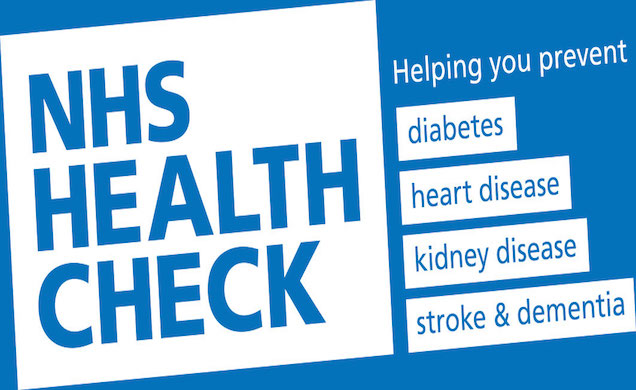NHS Health Checks

What is an NHS health check?
It's basically a free midlife MOT from NHS England. It can help you spot upcoming heart disease, diabetes, kidney disease, stroke and other health problems.
If you're aged 40-74 and don't already have a diagnosis for one of these conditions, you should have an NHS health check.
What happens?
It takes about 20 minutes. The health professional - usually a nurse - will ask you some simple questions, measure and weigh you, take your blood pressure and probably a small prick of blood from your finger. Based on this, they will be able to give you an idea of your risk of several serious diseases: heart disease, stroke, kidney disease and type 2 diabetes.
They'll then give you personalised advice to reduce your risk.
If you prefer you can ask specifically to see a man or a woman but it's not really necessary. The questions are very easy and not embarrassing and you won't have to take any clothing off.
Where do they happen?
GP practices should offer health checks. But there are also health checks carried out in other places in the community such as out-of-town stores, pubs, shopping centres, sports grounds etc. Keep an eye out.
Do NHS health checks work?
The NHS thinks so. They estimate that every year, NHS Health Checks:
- save 650 lives
- prevent 1,600 heart attacks and strokes
- prevent 4,000 people from developing type 2 diabetes
- detect at least 20,000 cases of type 2 diabetes or kidney disease earlier
One of the lives saved could be yours.
Is it a hassle? Tell me exactly what all the tests are
The questions are: your age, your ethnic group, whether you smoke, how much alcohol you drink and how much exercise you do. They will also ask whether any close relatives have had any of the diseases being checked for and may ask other questions to see if you have any symptoms of these diseases.
The tests are:
- measuring your height and weighing you (to work out your Body Mass Index or BMI)
- taking your blood pressure (using a cuff fitted over your upper arm)
- taking a finger prick of blood (to measure your cholesterol level)
The results of the tests and questions are combined to give you an estimate of your risk of the various diseases.
You may need other tests afterwards - for example to measure your blood sugar level if the healthcare professional thinks that you may have diabetes.
All very easy really.
Sounds useful. Can I have a health check?
You should get an invitation from your GP if you're in the eligible group. If you haven't yet been invited you will be over the next few years. But why not just ask your GP now.
What's it like?
Read Kevin's story: 'Get a health check'
Anything I can do now?
You can find information about most health conditions here on the Men's Health Forum's website. There's also a heart age test on the NHS Choices website. Follow this link if you need to find a GP?
Date published
30/04/15
Date of last review
19/11/20
Date of next review
19/11/23
References
|
The Men’s Health Forum need your support It’s tough for men to ask for help but if you don’t ask when you need it, things generally only get worse. So we’re asking. In the UK, one man in five dies before the age of 65. If we had health policies and services that better reflected the needs of the whole population, it might not be like that. But it is. Policies and services and indeed men have been like this for a long time and they don’t change overnight just because we want them to. It’s true that the UK’s men don’t have it bad compared to some other groups. We’re not asking you to ‘feel sorry’ for men or put them first. We’re talking here about something more complicated, something that falls outside the traditional charity fund-raising model of ‘doing something for those less fortunate than ourselves’. That model raises money but it seldom changes much. We’re talking about changing the way we look at the world. There is nothing inevitable about premature male death. Services accessible to all, a population better informed. These would benefit everyone - rich and poor, young and old, male and female - and that’s what we’re campaigning for. We’re not asking you to look at images of pity, we’re just asking you to look around at the society you live in, at the men you know and at the families with sons, fathers and grandads missing. Here’s our fund-raising page - please chip in if you can. |


